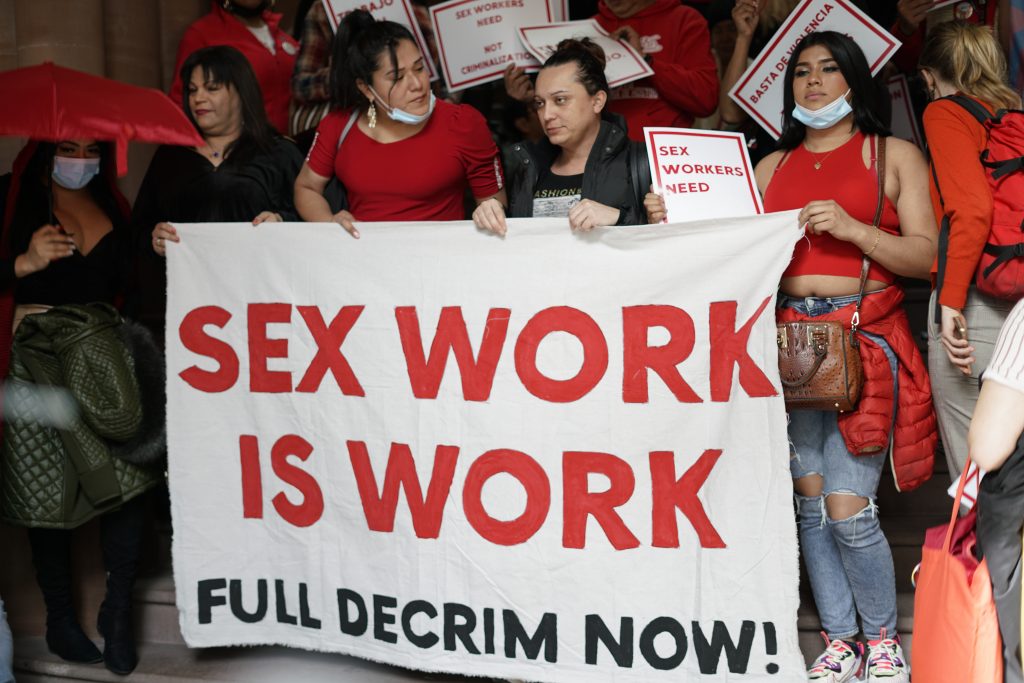
A sea of red accessories, lipstick, umbrellas and clothing embellished the crowd of around 60 people chanting at the Million Dollar Staircase in the Capitol on March 1.
Sporting a red umbrella symbolizes the solidarity of the sex workers’ rights movement, the practice was established in Venice, Italy in 2001 during the 49th Venice Biennale of Art. The march to the press conference in the New York State Capitol mirrored the Italian event in which sex workers took part in an art installation in the “Prostitute’s Pavillion.”
Currently, prostitution is considered a class B misdemeanor in New York state. “Defendants facing prostitution charges could be sentenced for up to three months in jail and pay a fine up to $500,” according to Article 230 of New York’s Penal Code.
“Hochul, escucha estamos en la lucha!” This chant, translating roughly to asking Hochul to “listen to us in our fight” took over the crowd.
Steered by activist and communications leader of DecrimNY, SX Noir, the crowd demanded for Hochul to pass the Stop Violence in the Sex Trades Act (SVSTA), a bill that, if passed, would potentially decriminalize sex work in New York.
The bill (S.4396) is currently in the Codes Committee of the Senate and has been since Feb. 8, 2023. The advocates hope the bill passes the Senate and Assembly and ultimately makes it to Gov. Hochul’s desk.
In a press release, the organization supporting the event, DecrimNY, argued that the decriminalization of prostitution will improve the conditions of sex workers by reducing coercion and violence against them, especially by police officers, reducing STI transmission by allowing sex workers to negotiate terms with their clients and protect the systematically disadvantaged, as a large population of sex workers in New York are transgender, immigrants or children of immigrants, queer and/or women of color.
“Comprehensive decriminalization enables sex workers to negotiate condom use and work collaboratively without the fear of criminalization,” said SX Noir. “It also enables sex workers to seek medical and legal help without fear of economic consequences or legal repercussions.”
Current and former sex workers took to the podium to share their experiences in the profession, with accounts of being coerced by police officers into sexual favors to avoid charges.
“I was forced to say yes. I did what he told me to do, because as an immigrant person, I knew that an arrest would bring immigration consequences that can cause deportation,” said Dennise Cruz, leader from the Trans Immigrant Project at Make the Road New York, recalling an encounter she had with a retired detective who threatened her into coercion. “A deportation can cost my life.”
Assembly Member Jessica González-Rojas, D-Jackson Heights, a long-time supporter of the cause, views the fight for decriminalizing sex work as being under the same umbrella as consenting adults fighting for their bodily autonomy.
“If sex work is how you pay your bills, how you feed your family, and how you survive, we should be making it safer and not more dangerous for you to do so,” said Sen. González-Rojas. “Criminalization of any kind is violence.”
Also present at the press conference was Assembly Member Chantel Jackson, D-Belmont,, stating that the cause “has an advocate in Chantel Jackson from the Bronx,” and expressed her intention to “carry” the bill.
“If this is what you want to do, then we, as legislators, should be fighting for your right to do it. It’s simple,” said Assembly Member Catalina Cruz, D-Corona.
Described as the “oldest profession on earth,” sex work continues to be a form of survival for New Yorkers, despite its legality. The decriminalization of both the solicitation and the consumption of sex work in New York aims to recognize that “sex work is real work,” and provide safety measures to ensure the reduction of coercion and violence against traditionally undervalued and overlooked sex workers.

















